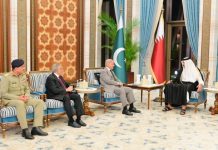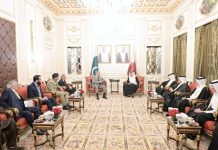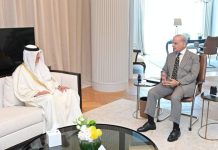-Issues guidelines for Youm-e-Ali RA, Aitekaf, Eidul Fitr
-Bans inbound pedestrian movement from Afghanistan, Iran
-All ventilators in Gujranwala, 81.5pc in Lahore occupied
-COVID claims 113 lives, infects 4,414 more people
-President asks Ulema to ensure SOPs in mosques
By Ajmal Khan Yousafzai
ISLAMABAD: The National Command and Operation Centre (NCOC) on Sunday issued guidelines for Youm-e-Ali (RA), Aitekaf, Shab-e-Qadr, Jummatul Wida and Eidul Fitr to curb the spread of coronavirus.
The NCOC stated in its guidelines that Youm-e-Ali (RA) processions are completely banned, whereas, clerics and zakireen will make the citizens aware of the virus.
However, majalis will be allowed to be organised where all participants will undergo thermal screening and mandatory to wear face masks. One metre distance will be maintained among all indoor and outdoor majalis among all participants besides completely complying with the standard operating procedures (SOPs).
Those having symptoms of coronavirus will be barred to participate in the majalis in connection with the Youm-e-Ali (RA). The NCOC also advised organising the majalis online or at outdoor locality besides ensuring to make special arrangements for sanitisers and soaps for washing hands. It has been advised for people aged above 50 years and children not to attend the majalis, whereas, the religious gatherings of Youm-e-Ali (RA) will be banned to be held in congested localities. Clerics and zakireen will have to undergo a coronavirus test and only covid-negative clerics and zakireen will be allowed to attend a majlis. Thermal screening should be made on the gates of imam bargahs and mosques and marking should be made for the sitting arrangements for the people to maintain a distance of at least 3 feet during majalis. The organisers of majalis will be bound to ensure disinfectant spray on the venues daily.
Aitekaf
The centre asked those people having COVID-19 symptoms to observe aitekaf at their homes instead of coming to mosques and imam bargahs. However, those coming to the mosques should take their beds and other necessary items from the home and avoid joint meals of Sehri and Iftari.
Jummatul Wida
The NCOC directed to make separate entry and exit routes at the venues of Jummatul Wida gatherings. Special arrangements must be made for thermal scanning and sanitization of people arriving at the venues for offering Jummatul Wida prayers.
People have also be asked to perform ablution at their homes before arriving at the mosques or other venues for Jummatul Wida gatherings.NCOC also reviewed border management protocols with neighbouring Afghanistan and Iran as new Covid-19 variants emerge in the region.”The current policy of Land Border Management with Afghanistan and Iran has been reviewed to ensure regulated inbound pedestrian movement and effective management of COVID protocols at Border Terminals(BTS),” read the statement issued by National Command and Operation Centre (NCOC).
The revised policy will be effective from midnight May 4-5 till midnight May 19-20. The policy will only be applicable to inbound pedestrians with no effect on the existing cargo/trade (bilateral / Afghan Transit Trade) movement.
According to the NCOC statement, border terminals (BTs) will remain open for seven days a week. “Employment strength of LEAs/health staff at BTs will be increased for implementation of testing protocols and to control high traffic density,” read the statement. The coronavirus monitoring body said inbound pedestrian movement would cease with effect from midnight May 4-5 with the exception of Pakistani nationals in Afghanistan and Iran who desire to return to their country and in extreme medical emergency cases etc. It also said that all outbound pedestrian movement is permissible.
Highlighting the testing and quarantining protocols, NCOC said inbound pedestrians will undergo Rapid Antigen Test(RAT). Positive cases (for Pakistani nationals only) will be shifted to nearby quarantine facilities. “Inbound pedestrian with Afghan exemptions will also undergo RAT testing at BTs. Positive cases, if any, will be reverted back to Afghanistan,” read the NCOC statement. It also said that thermal scanning for all drivers and co-drivers will be carried out on arrival at the BTs. Symptomatic cases will undergo RAT testing, positive cases will be dealt with as per the procedure spelled above. Meanwhile, Punjab Health Minister Dr Yasmin Rashid said on Sunday that almost all ventilators in Gujranwala were occupied while the occupancy rate in Lahore was 81.5 per cent, adding however, that the health department was making efforts to shore up facilities.
She provided the details during a press conference held in Lahore to update the public regarding the coronavirus situation in the province. Giving details of healthcare facilities, Rashid said that there were 2,730 beds in district headquarters hospitals (DHQs) in Punjab of which around 600 were currently occupied. There were 97 ventilators in the DHQs of which 20 were in use, she added. “All facilities and human resources are available,” she assured.
The minister said that the infectivity rate in Lahore, which had been significantly high previously, had now been reduced in comparison to other cities for which she credited the district administration’s efforts to ensure strict compliance with standard operating procedures (SOPs). “There is a lot of noise that the conditions in Lahore are bad,” Rashid said, sharing that 30 areas of the city were under smart lockdown. “On April 25, we had 1,340 patients admitted in hospitals and today, we have 1,149. The number of patients has decreased a bit. Occupancy of oxygen beds was 72pc, now it is 42pc.”
She said that the provincial government had provided 50 ventilators to public sector hospitals in Lahore, stressing that “there has been no interruption in oxygen, no problem was created.” Rashid said that 280 beds had been added to the high dependency unit (HDU) at Lahore’s Expo Centre while 10 ventilators were also being added as a “backup option” in case the city’s hospitals were strained. “If we have a problem right now, it is Gujranwala,” she said where almost 100pc of the ventilators were occupied.
Ventilator occupancy
Talking about the health department’s efforts to tackle the situation, she said that five ventilators had been sent to the city while ambulances equipped with ventilators were also being prepared to transport patients from Gujranwala to Lahore if needed.
“We held a meeting with the private sector in Lahore three days ago and received a very positive response. In the private sector, we have 300 high flow oxygen beds in teaching hospitals. We are receiving support of 300 beds and 30 ventilators from the private sector which they have said they will not take charges for.” In addition, private sector hospitals would also fix charges for Covid-19 treatment so there would be no complaints, Rashid said.
Moving on to other cities, the health minister said the ventilator occupancy rate in Multan stood at 88pc, followed by Sargodha at 80pc, Bahawalpur at 52pc, Dera Ghazi Khan at 39pc and Faisalabad at 38pc. She clarified that there was no problem in meeting the province’s oxygen demands. “Rawalpindi Institute of Cardiology generates its own oxygen to fulfil its need. The cabinet committee has given us permission to get oxygen generators for the future,” she said, adding that the procurement process for teaching hospitals had already started.
Rashid said the industry had also assured the government that there would be no obstacle in diverting oxygen to hospitals. Talking about the availability of medicines, Rashid said Actemra, an injectable drug used to treat critically ill Covid-19 patients, was “freely available” and had been used for 956 patients so far. “We have bought 1,000 more,” she added.
She said the government was starting a study on anti-viral drug Remdesivir to find out its effectiveness in treating Covid patients. The study would be carried out in three hospitals, Pakistan Kidney and Liver Institute, Mayo Hospital and Jinnah Hospital, and the results would be shared with the media after the trials were completed.
During in the day, President Dr. Arif Alvi has asked the Ulema to ensure Standard Operating Procedures (SOPs) in mosques as we need to demonstrate the discipline like a responsible nation against COVID-19.
Talking to Mohtamin of Wafaq-ul-Madaris Qari Hanif Jalandhari and Allama Sajid Naqvi on telephone, the President appealed them to observe all SOPs during Ramadan. He asked the Ulema to stress the people to wear masks while offering prayers and observe the distance. Dr Arif Alvi appealed Allama Sajid Naqvi to convince the people to wear mask and observe distance at Majalis. Allama Sajid Naqvi assured the President of full implementation of SOPs and said all precautionary measures will be ensured.
President said he has written letters to Wafaq-ul-Madaris to implement the SOPs in all madaris and mosques during holy month of Ramadan.COVID Deaths, Infections; The national tally on Sunday of total active COVID-19 cases recorded 89,661 with 4,414 more people tested positive for the deadly virus and 5,193 people recovered from the disease during the last 24 hours.
One hundred and thirteen corona patients have died during past 24 hours, 102 of whom were under treatment in hospital and 11 out of the hospital in their respective quarantines or homes, according to the latest update issued by the National command and Operation Centre (NCOC). During the past 24 hours, most of the deaths have occurred in the Punjab followed by Khyber Pakhtunkhwa. Out of the total 113 deaths occurred in the last 24 hours 41 were on ventilators.
The maximum ventilators were occupied in four major cities including Lahore 68 percent, Multan 74 percent, Bahawalpur 67 percent and Mardan 70 percent.
The maximum Oxygen beds (alternate oxygen providing facility other than ventilator administered as per medical requirement of COVID patient) was also occupied in four major areas including Swabi 63 percent, Mardan 69 percent, Peshawar 71 percent and Swat 60 percent.Around 663 ventilators were occupied elsewhere in the country while no COVID affected person was on ventilator in Gilgit Baltistan (GB) and Balochistan. Some 45,275 tests were conducted across the country on Saturday, including 14,739 in Sindh, 16,846 in Punjab, 7,913 in Khyber Pakhtunkhwa (KP), 3,894 in Islamabad Capital Territory, 768 in Balochistan, 384 in GB, and 731 in AJK.
Around 722,202 people have recovered from the disease so far across the country making it a significant count with over 90 percent recovery ratio of the affected patients. Since the pandemic spread, a total of 829,933 cases were detected that also included the perished, recovered and under treatment COVID-19 patients so far, including Azad Jammy and Kashmir 17,297, Balochistan 22,528, Gilgit Baltistan 5,312, Islamabad Capital Territory 75,892, KP 119,277, Punjab 304,889 and Sindh 284,738.
About 18,070 deaths were recorded in country since the eruption of the contagion. Around 4,658 have perished in Sindh among 13 of them died in hospital and one out of the hospital on Saturday. Around 8,550 died in Punjab with 50 lost their battle of life in past 24 hours. 40 of them in the hospital and 10 out of hospital. 3,350 died in KP as 39 of them died in hospital and one out of hospital on Saturday, while 691 breathed their last in Islamabad Capital Territory among eight deaths occurred in the hospital during past 24 hours,




